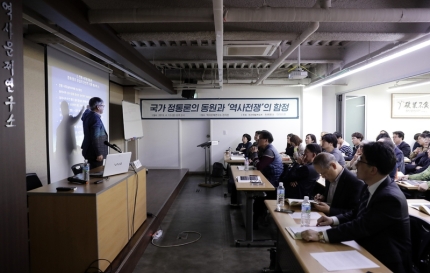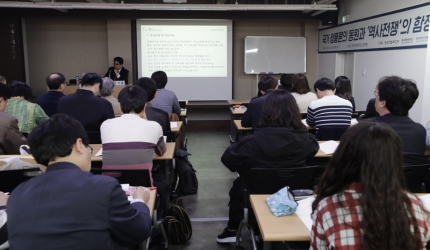다르지만 조화한다 : 불교와 기독교의 내통 - 두 세계를 동시에 살아가기
이찬수 (지은이)
모시는사람들2015-08-31

320쪽
책소개
기독교 신학자, 목회자이면서 화엄철학과 선불교를 공부한 저자가 불교와 기독교를 비교하며 내면에서 상통하는 종교적 본질을 밝힌 책. 불교적 언어가 불자에게 주는 의미와 기독교적 언어가 기독교인에게 주는 의미의 정도가 다르지 않음을 말하면서 서로를 통해 자신에게 더 깊어지는 종교 공부와 수행을 이끌어 내고, 신앙의 거룩함을 일깨운다.
불교와 기독교가 표면상 외형상 전혀 다른 종교임에도 불구하고 심층에서 서로 통하는 면이 더 크고 깊다는 사실을 해명한다. 기독교가 절대유의 차원에 서 있다면 불교는 절대무의 차원에 서 있으나, 절대는 절대로 통하는 법이다. 불교와 기독교의 종착점은 결국 동등한 체험의 깊이를 나타내며, 붓다와 예수가 말하고자 했던 세계도 결국 동등하다는 것이다.
목차
1부_ 깨달음의 길에 서다
01 인연에 따르다 : 불교의 인간론
02 믿음과 용기, 그리고 깨달음 : 지눌의 신심론과 틸리히의 신앙론
2부_ 불교와 기독교 서로 만나다
03 법신불 일원상과 범재신론 : 원불교의 일원주의와 세계주의
04 모두 절대무 안에 있다 : 니시다의 철학과 기독교
05 창조적 만남과 궁극적 일치 : 길희성과 타나베의 신학과 철학
06 두 종교를 동시에 살아가다 : 불교적 그리스도인 니터의 고백
07 신학을 불교화하다 : 야기의 불교적 신학
08 불교를 수용하며, 신학을 변호하다 : 발덴펠스의 자기 비움의 신학
3부_ 두 세계를 다시 보다
09 종교는 해석이다 : 스힐레벡스의 신학적 해석학: 모든 종교는 해석이다
10 오늘 우리의 구원과 해탈 : 어느 불교적 신학자의 구원관
11 비종교적인 그러나 종교적인 : 비종교인 리영희가 보는 기독교와 불교
12 90점 불교와 70점 기독교 : 두 종교에 대한 애정어린 요청과 희망
--------------------------
책속에서
P.37
지눌 선사상에서 믿음과 앎은 깨달음, 즉 돈오와 다르지 않다. 여기서 우리는 지눌이 믿음과 앎의 해석에도 깊은 주의를 기울였던 이유를 알 수 있다. 지눌은 『신화엄경론』과 만나는 체험 후에 원돈신해문, 즉 원돈교에서의 믿음과 앎으로 들어가는 문을 상세히 밝혔다. 다시 말해서 전통적으로 선에서 강조하던 돈오를 믿음과 앎이라는 언어로 해석함으로써 화엄의 선화(... 더보기
P.69
법신불은 구체적 “상징” 또는 “나타낸 바”의 차원과 단순히 동일시할 수 없다. 법신불은, 경험적으로는 불타에게서 알려졌으되, 논리적으로는 그 불타 및 다양한 불보살들의 존재론적 근거로, 또는 다양한 불들을 정말 불이게 해 주는 원천으로 상상된 개념이다. 상상되었다고 해서 그저 허구라는 뜻은 아니다. 깨달음이라는 것이 어떻게 가능한지 설명하려면 먼저 그 깨... 더보기
P.151
한국인은 기독교인이기 이전에 다양한 종교 사상들을 녹여 내고 있는 한국 안에서 한국인으로 살아왔고, 여전히 한국인이기 때문이다. 사실상 그 종교 사상들을 매개로 해서 기독교를 이해하고 수용할 수 있었기 때문이다. 그런 점에서 한국인 안에 녹아들어 가 있는 한국의 종교가 한국의 기독교를 기독교되게 해 준다는 것은 너무도 당연하다. 한국 종교가 이미 온전히 담... 더보기
P.186
(일본의 신학자) 야기는 이러한 불교와의 만남에서 인간은 성서와 십자가의 직접적 도움 없이도 본래성을 획득할 수 있는 존재임을 깨달았다. 아무리 죄 없는 사람(=예수)이라 해도 한 인간이 타인의 죄를 짊어진다는 것은 불가능하다. (중략) 십자가는 본래적 실존으로 이끄는 매개이고 성서는 실존의 근저의 표현이다. 따라서 인간은 “선교의 말씀 안에서만 그리스도와... 더보기
P.254
차별적으로 존재하는 듯한 불교와 기독교의 개개 ‘형식’ 내지 ‘제도’를 벗기고그 내면으로 들어가면 거기에는 불교와 기독교란 따로 없다. ‘너’의 요구에 부응하면서 살아갈 수밖에 없는 원천적 삶에는 종파가 따로 없는 것이다. 범아일여(梵我一如)라고 하는 원천적 사실에 종파 간, 성별 간, 지역 간 차이가 없는 것이다. 이미 하느님의 형상대로 창조되어 있는 인... 더보기
저자 및 역자소개
이찬수 (지은이)
저자파일
최고의 작품 투표
신간알림 신청
서강대학교 화학과를 졸업하고 같은 대학교 대학원 종교학과에서 불교학과 신학으로 각각 석사학위를, 칼 라너(Karl Rahner)와 니시타니 게이지(西谷啓治)를 비교하여 박사학위를 받았다. 강남대학교 교수, (일본)WCRP평화연구소 객원연구원, 대화문화아카데미 연구위원 등을 지냈고, 종교철학에 기반한 평화인문학의 심화와 확장을 연구 과제로 삼고 있다.
기독교 신학자, 목회자이면서

320쪽
책소개
기독교 신학자, 목회자이면서 화엄철학과 선불교를 공부한 저자가 불교와 기독교를 비교하며 내면에서 상통하는 종교적 본질을 밝힌 책. 불교적 언어가 불자에게 주는 의미와 기독교적 언어가 기독교인에게 주는 의미의 정도가 다르지 않음을 말하면서 서로를 통해 자신에게 더 깊어지는 종교 공부와 수행을 이끌어 내고, 신앙의 거룩함을 일깨운다.
불교와 기독교가 표면상 외형상 전혀 다른 종교임에도 불구하고 심층에서 서로 통하는 면이 더 크고 깊다는 사실을 해명한다. 기독교가 절대유의 차원에 서 있다면 불교는 절대무의 차원에 서 있으나, 절대는 절대로 통하는 법이다. 불교와 기독교의 종착점은 결국 동등한 체험의 깊이를 나타내며, 붓다와 예수가 말하고자 했던 세계도 결국 동등하다는 것이다.
목차
1부_ 깨달음의 길에 서다
01 인연에 따르다 : 불교의 인간론
02 믿음과 용기, 그리고 깨달음 : 지눌의 신심론과 틸리히의 신앙론
2부_ 불교와 기독교 서로 만나다
03 법신불 일원상과 범재신론 : 원불교의 일원주의와 세계주의
04 모두 절대무 안에 있다 : 니시다의 철학과 기독교
05 창조적 만남과 궁극적 일치 : 길희성과 타나베의 신학과 철학
06 두 종교를 동시에 살아가다 : 불교적 그리스도인 니터의 고백
07 신학을 불교화하다 : 야기의 불교적 신학
08 불교를 수용하며, 신학을 변호하다 : 발덴펠스의 자기 비움의 신학
3부_ 두 세계를 다시 보다
09 종교는 해석이다 : 스힐레벡스의 신학적 해석학: 모든 종교는 해석이다
10 오늘 우리의 구원과 해탈 : 어느 불교적 신학자의 구원관
11 비종교적인 그러나 종교적인 : 비종교인 리영희가 보는 기독교와 불교
12 90점 불교와 70점 기독교 : 두 종교에 대한 애정어린 요청과 희망
--------------------------
책속에서
P.37
지눌 선사상에서 믿음과 앎은 깨달음, 즉 돈오와 다르지 않다. 여기서 우리는 지눌이 믿음과 앎의 해석에도 깊은 주의를 기울였던 이유를 알 수 있다. 지눌은 『신화엄경론』과 만나는 체험 후에 원돈신해문, 즉 원돈교에서의 믿음과 앎으로 들어가는 문을 상세히 밝혔다. 다시 말해서 전통적으로 선에서 강조하던 돈오를 믿음과 앎이라는 언어로 해석함으로써 화엄의 선화(... 더보기
P.69
법신불은 구체적 “상징” 또는 “나타낸 바”의 차원과 단순히 동일시할 수 없다. 법신불은, 경험적으로는 불타에게서 알려졌으되, 논리적으로는 그 불타 및 다양한 불보살들의 존재론적 근거로, 또는 다양한 불들을 정말 불이게 해 주는 원천으로 상상된 개념이다. 상상되었다고 해서 그저 허구라는 뜻은 아니다. 깨달음이라는 것이 어떻게 가능한지 설명하려면 먼저 그 깨... 더보기
P.151
한국인은 기독교인이기 이전에 다양한 종교 사상들을 녹여 내고 있는 한국 안에서 한국인으로 살아왔고, 여전히 한국인이기 때문이다. 사실상 그 종교 사상들을 매개로 해서 기독교를 이해하고 수용할 수 있었기 때문이다. 그런 점에서 한국인 안에 녹아들어 가 있는 한국의 종교가 한국의 기독교를 기독교되게 해 준다는 것은 너무도 당연하다. 한국 종교가 이미 온전히 담... 더보기
P.186
(일본의 신학자) 야기는 이러한 불교와의 만남에서 인간은 성서와 십자가의 직접적 도움 없이도 본래성을 획득할 수 있는 존재임을 깨달았다. 아무리 죄 없는 사람(=예수)이라 해도 한 인간이 타인의 죄를 짊어진다는 것은 불가능하다. (중략) 십자가는 본래적 실존으로 이끄는 매개이고 성서는 실존의 근저의 표현이다. 따라서 인간은 “선교의 말씀 안에서만 그리스도와... 더보기
P.254
차별적으로 존재하는 듯한 불교와 기독교의 개개 ‘형식’ 내지 ‘제도’를 벗기고그 내면으로 들어가면 거기에는 불교와 기독교란 따로 없다. ‘너’의 요구에 부응하면서 살아갈 수밖에 없는 원천적 삶에는 종파가 따로 없는 것이다. 범아일여(梵我一如)라고 하는 원천적 사실에 종파 간, 성별 간, 지역 간 차이가 없는 것이다. 이미 하느님의 형상대로 창조되어 있는 인... 더보기
저자 및 역자소개
이찬수 (지은이)
저자파일
최고의 작품 투표
신간알림 신청
서강대학교 화학과를 졸업하고 같은 대학교 대학원 종교학과에서 불교학과 신학으로 각각 석사학위를, 칼 라너(Karl Rahner)와 니시타니 게이지(西谷啓治)를 비교하여 박사학위를 받았다. 강남대학교 교수, (일본)WCRP평화연구소 객원연구원, 대화문화아카데미 연구위원 등을 지냈고, 종교철학에 기반한 평화인문학의 심화와 확장을 연구 과제로 삼고 있다.
저서로
『평화와 평화들: 평화다원주의와 평화인문학』,
『다르지만 조화한다, 불교와 기독교의 내통』,
『사람이 사람을 심판할 수 있는가: 사형폐지론과 회복적 정의』(공역),
『아시아평화공동체』가 있고,
논문으로는
“베트남공화국의 몰락: 지엠 정권의 식민지적 민족주의, 서구적 종교편향, 하향적 반공주의를 중심으로”,
“平和はどのように構\築されるか: 減暴\力と平和構\築”,
“Disaster: The Otherization of Nature, the Reification of Human Beings, and the Sinking of MV of Sewol”,
“祭祀の政治學 II:明治時代の國家神道と公私觀”
기독교 신학자, 목회자이면서
화엄철학과 선(禪)불교를 공부한 저자가
불교와 기독교를 비교하며 내면에서 상통하는 종교적 본질을 밝힌 책이다.
이 책은 불교적 언어가 불자에게 주는 의미와
기독교적 언어가 기독교인에게 주는 의미의 정도가 다르지 않음을 말하면서
서로를 통해 자신에게 더 깊어지는 종교 공부와 수행을 이끌어 내고,
그리고 신앙의 거룩함을 일깨운다.
■ 출판사 서평
깨달음에서 서로를 경유하여 다시 자신에게로
이 책은 ‘세계적 차원의 종교들이 균질적인 세력을 형성하면서도 대립과 조화 사이를 오가는 기이한 종교 왕국’인 한국에서 태어난 한 신학자의 자기 고백과 그에 관한 부연이다; “나는 한 사람의 그리스도인으로 출발했다. 나는 나 자신이 한국인임을 발견했다. 그리고 나는 한 사람의 그리스도인임을 그만두지 않은 채 한 사람의 불자가 되어서 돌아왔다.” 인도의 신학자 파니카의 말을 빌려 표현한 대로 불교와 기독교가 궁극적 차원에서는 만나리라는 기대를 가지고 저자는 신학적으로나 실천적으로 소통하는 노력을 기울여 왔다. 그 과정에서 고립되고 배척당하는 고난을 겪기도 했으나 그의 신학 역정과 신앙 모색은 멈추질 않았다.
다르지만 조화한다, 불교와 기독교의 심층
이 책은 불교와 기독교가 표면상 외형상 전혀 다른 종교임에도 불구하고 심층에서 서로 통하는 면이 더 크고 깊다는 사실을 해명한다. 불교와 기독교의 종착점, 가령 공(空)과 하느님, 열반과 하느님 나라, 그리스도와 보살, 기도와 염불 등은 결국 동등한 체험의 깊이를 나타내며, 붓다와 예수가 말하고자 했던 세계도 결국 동등하다는 것이다. ‘다르지만 조화한다’라는 말은 “군자는 상대와 조화하면서 차이도 인정한다(君子和而不同)”는 공자의 말씀을 염두에 둔 것으로, 언어와 관념을 넘어서는 근원의 세계, 궁극의 세계를 이야기한다. 기독교가 절대유의 차원에 서 있다면, 불교는 절대무의 차원에 서 있으나, 절대는 절대로 통하는 법이다.
불교적 그리스도인, 폴 니터의 불교
저자는 두 종교 사이를 넘나들며 스스로를 완성시키는 신학자로 미국의 신학자 폴 니터(Paul F. Knitter, 1939- )를 예로 든다. 니터 또한 불교를 창조적으로 소화해낸 대표적 신학자이다. 니터는 신학자로서 불교 언어를 치열하게 소화해, 신학적 양심에 솔직하게 녹여내어 고백하는 데에 독보적인 성취를 이루었다. 저자는 태생이 기독교인이고 일급 신학자이지만, 두 종교를 단순 병렬식으로가 아니라, 하나로 녹여내 살아가는 것이 가능하다는 것을 웅변적이고 체험적으로 보여준 니터를 종교다원주의 신학자이자 불교학자라고 명명한다. 그 밖에도 원불교 사상과 기독교, 쿄토학파와 기독교, 한국의 길희성과 타나베 비교 등을 통해서도 이점을 구명한다.
90점의 불교와 70점의 기독교
저자는 종교의 깊이와 넓이를 수치화해서 불교가 90%쯤 완성된 종교라면, 기독교는 70%쯤 완성된 종교라고 말한다. 그럼에도 불구하고, 이러한 세속적 수치를 넘어서서 불교가 정말로 깊고 넓다면 ‘밖’의 것을 소화해 받아들이는 태도를 좀더 확연히 보여주어야 한다고 강조한다. 그런데 밖을 받아들이려면 관심을 갖고 공부해야 한다. 그런 점에서 불교는 모자라는 30%를 채우려는 기독교인의 노력 이상으로 공부를 심화하여 부족한 10%를 채워야 한다. 기독교는 더 말할 것도 없다. 그러다 보면, 종국에는 딱히 ‘성인이랄 것도 따로 없는 확연무성(廓然無聖)의 진리’를 공
■ 출판사 서평
깨달음에서 서로를 경유하여 다시 자신에게로
이 책은 ‘세계적 차원의 종교들이 균질적인 세력을 형성하면서도 대립과 조화 사이를 오가는 기이한 종교 왕국’인 한국에서 태어난 한 신학자의 자기 고백과 그에 관한 부연이다; “나는 한 사람의 그리스도인으로 출발했다. 나는 나 자신이 한국인임을 발견했다. 그리고 나는 한 사람의 그리스도인임을 그만두지 않은 채 한 사람의 불자가 되어서 돌아왔다.” 인도의 신학자 파니카의 말을 빌려 표현한 대로 불교와 기독교가 궁극적 차원에서는 만나리라는 기대를 가지고 저자는 신학적으로나 실천적으로 소통하는 노력을 기울여 왔다. 그 과정에서 고립되고 배척당하는 고난을 겪기도 했으나 그의 신학 역정과 신앙 모색은 멈추질 않았다.
다르지만 조화한다, 불교와 기독교의 심층
이 책은 불교와 기독교가 표면상 외형상 전혀 다른 종교임에도 불구하고 심층에서 서로 통하는 면이 더 크고 깊다는 사실을 해명한다. 불교와 기독교의 종착점, 가령 공(空)과 하느님, 열반과 하느님 나라, 그리스도와 보살, 기도와 염불 등은 결국 동등한 체험의 깊이를 나타내며, 붓다와 예수가 말하고자 했던 세계도 결국 동등하다는 것이다. ‘다르지만 조화한다’라는 말은 “군자는 상대와 조화하면서 차이도 인정한다(君子和而不同)”는 공자의 말씀을 염두에 둔 것으로, 언어와 관념을 넘어서는 근원의 세계, 궁극의 세계를 이야기한다. 기독교가 절대유의 차원에 서 있다면, 불교는 절대무의 차원에 서 있으나, 절대는 절대로 통하는 법이다.
불교적 그리스도인, 폴 니터의 불교
저자는 두 종교 사이를 넘나들며 스스로를 완성시키는 신학자로 미국의 신학자 폴 니터(Paul F. Knitter, 1939- )를 예로 든다. 니터 또한 불교를 창조적으로 소화해낸 대표적 신학자이다. 니터는 신학자로서 불교 언어를 치열하게 소화해, 신학적 양심에 솔직하게 녹여내어 고백하는 데에 독보적인 성취를 이루었다. 저자는 태생이 기독교인이고 일급 신학자이지만, 두 종교를 단순 병렬식으로가 아니라, 하나로 녹여내 살아가는 것이 가능하다는 것을 웅변적이고 체험적으로 보여준 니터를 종교다원주의 신학자이자 불교학자라고 명명한다. 그 밖에도 원불교 사상과 기독교, 쿄토학파와 기독교, 한국의 길희성과 타나베 비교 등을 통해서도 이점을 구명한다.
90점의 불교와 70점의 기독교
저자는 종교의 깊이와 넓이를 수치화해서 불교가 90%쯤 완성된 종교라면, 기독교는 70%쯤 완성된 종교라고 말한다. 그럼에도 불구하고, 이러한 세속적 수치를 넘어서서 불교가 정말로 깊고 넓다면 ‘밖’의 것을 소화해 받아들이는 태도를 좀더 확연히 보여주어야 한다고 강조한다. 그런데 밖을 받아들이려면 관심을 갖고 공부해야 한다. 그런 점에서 불교는 모자라는 30%를 채우려는 기독교인의 노력 이상으로 공부를 심화하여 부족한 10%를 채워야 한다. 기독교는 더 말할 것도 없다. 그러다 보면, 종국에는 딱히 ‘성인이랄 것도 따로 없는 확연무성(廓然無聖)의 진리’를 공



 원본보기임종명 전남대 교수(사학과)가 12일 오후 서울 동대문구 제기동 역사문제연구소에서 역사문제연구소와 역사학연구소, 한국역사연구회가 주최한 `국가 정통론의 동원과 ‘역사전쟁'의 함정' 주제의 학술회의에서 ‘근대 정통론과 기원·계보의 정치’를 주제로 발표하고 있다. 김명진 기자 littleprince@hani.co.kr“
원본보기임종명 전남대 교수(사학과)가 12일 오후 서울 동대문구 제기동 역사문제연구소에서 역사문제연구소와 역사학연구소, 한국역사연구회가 주최한 `국가 정통론의 동원과 ‘역사전쟁'의 함정' 주제의 학술회의에서 ‘근대 정통론과 기원·계보의 정치’를 주제로 발표하고 있다. 김명진 기자 littleprince@hani.co.kr“ 원본보기홍석률 성신여대 교수(사학과)가 12일 오후 서울 동대문구 제기동 역사문제연구소에서 역사문제연구소와 역사학연구소, 한국역사연구회가 주최한 `국가 정통론의 동원과 ‘역사전쟁'의 함정' 학술회의에서 “‘역사전쟁’을 성찰하며”란 주제로 발표하고 있다. 김명진 기자 littleprince@hani.co.kr
원본보기홍석률 성신여대 교수(사학과)가 12일 오후 서울 동대문구 제기동 역사문제연구소에서 역사문제연구소와 역사학연구소, 한국역사연구회가 주최한 `국가 정통론의 동원과 ‘역사전쟁'의 함정' 학술회의에서 “‘역사전쟁’을 성찰하며”란 주제로 발표하고 있다. 김명진 기자 littleprince@hani.co.kr 2019년 04월 12일 (금) 23:27:46 이자영 기자
2019년 04월 12일 (금) 23:27:46 이자영 기자  delicious_12@naver.com
delicious_12@naver.com



 [이자영 기자]
[이자영 기자]


































if some a**hole in a “JEW” worshipping society makes a claim about
a cult…?
by a synagogue of satan psychopathic cult member shooting through the roof
from a helicopter…